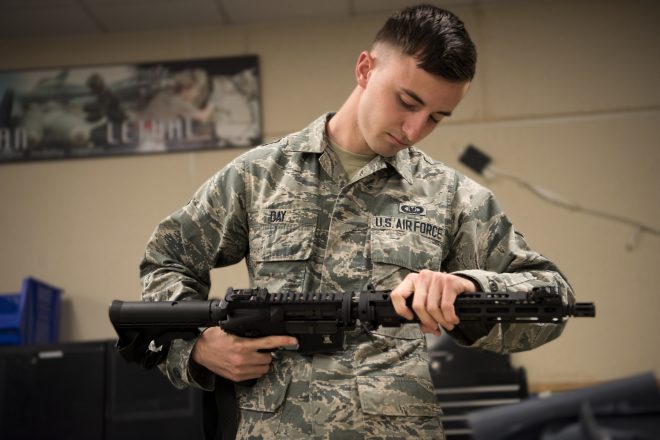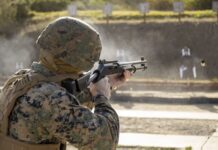
For the past year, if you had a Concealed Carry permit and a Department of Defense ID, you could keep your personal firearm locked in the car when you came to the base at Offutt. The 55th Wing Commander will prohibit that practice as of January 2 so you won’t even be able to bring your personal firearm on site. If you do, you’ll need to check it at the gate.
The Commander implied that the locked personal handguns aren’t necessary anyway since he has full confidence in the security forces squadron defending the installation.
I’m sure the commander of those young men and women murdered by Nidal Hasan on Fort Hood also would’ve said they had confidence in the security . That’s what commanders say, it’s a cookie cutter vote of confidence in other commands presenting a unified front. There is no circumstance where a commander wouldn’t publically make that statement about the security of their base and their troops.
And it’s probably got a grain of truth. The security forces wing are probably competent at their jobs, and were they deployed forward to guard an airbase overseas would probably be just fine at it.
But Offutt is in Nebraska… Those gate guards are waving Karen, Steve, Geoffrey, and Michelle onto base for their work day, not set to repel a hostile force or an angry mob of locals. That’s the fact. Perimeter security on domestic bases deal with domestic day-to-day traffic. Threats will be communicated by BOLO, texts, updates, and security condition. The perimeter security will be most able to respond if they are the target.
If its an active shooter getting into the base, the defense in depth is usually mobile patrol. Response will be directly dependant on where those patrols are in relation to the threat.
Policy and Law
Federal bases remain, for the most part, prohibited locations for carrying concealed. Carrying personal arms while in uniform is against DoD policies, this is in accordance with federal law. Soldiers who own weapons but live on base housing have regulations about the use and storage of their weapons, most are prohibited from the barracks.
State National Guard soldiers are a different matter. As state troops, not Federal, they can be authorized by the governor to carry personal weapons. Michigan is one such state. The rules only apply within the state and when not under drawn weapons but this policy allows for a workday standard defense in depth for state troops.
Small state armories do not have the established perimeter defenses of most federal facilities, however larger state run bases do have similar setups. This leads to an interesting intermixing on JMTC facilities where the state personnel on base and state native troops can be armed and federal troops training at the facilities cannot be.
Does it make sense? Yes and no.
Bases are complex population centers like any other municipality. They are additionally staffed by troops, people charged with preparing to fight on the nation’s behalf. This adds the complexity of weapon systems and training, and securing both those, to the normal population center equation.
The state allowing concealed carry for personnel increases the defense in depth of those state facilities by having more armed personnel covering the space. It increases the odds that any given location, if attacked, will have immediate armed support. Federal facilities must contend with their internal policies and staff to cover. The number of private arms on the base at the ready however does increase the number of opportunities for accidents, a fact commanders are extremely cautious over.
That reason, more than any other, undoubtedly drives the decision by the Offutt commanding officer and most others who, if they have latitude to grant their troops personal arms in any manner, do not.



